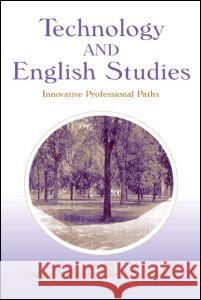Technology and English Studies: Innovative Professional Paths » książka
Technology and English Studies: Innovative Professional Paths
ISBN-13: 9780805845884 / Angielski / Twarda / 2005 / 272 str.
Technology and English Studies: Innovative Professional Paths
ISBN-13: 9780805845884 / Angielski / Twarda / 2005 / 272 str.
(netto: 696,83 VAT: 5%)
Najniższa cena z 30 dni: 654,86
ok. 16-18 dni roboczych.
Darmowa dostawa!
In scholarship about technology and English studies, there are a number of first-person narratives that suggest what may be termed "traditional" professional paths. That is, they chronicle the positive influence of a particular technology, class, professor, or publication, and suggest that it inspired a distinct and rewarding professional path. What is missing is the rest of the story--alternate ways that individuals have come to do work in technology and English studies and analysis of what this means for paths others might pursue. Technology and English Studies: Innovative Professional Paths meets this need.
The volume begins with definitions of its three central terms: technology, English Studies, and professional paths. Chapters are organized in four sections, reflecting both a chronological progression and thematic professional development: "The Past as the Future"; "Searching the Academy"; "Pushing Boundaries"; and "Forging Beyond." As a forerunner in addressing professionalization across the domains that comprise technology and English studies, it will prove foundational for many readers with non-traditional or otherwise alternate backgrounds who are working out what professional paths might be available to them.
Technology and English Studies: Innovative Professional Paths is an important professional development resource for professors, instructors, and graduate students across the field of English studies, including rhetoric and composition, computers and writing, computer-assisted language learning, literary and linguistic computing, literary studies, English education, technical communication, linguistics, writing centers, second-language education/ESL, and creative writing.
In scholarship about technology and English studies, there are a number of first-person narratives that suggest what may be termed "traditional" professional paths. That is, they chronicle the positive influence of a particular technology, class, professor, or publication, and suggest that it inspired a distinct and rewarding professional path. What is missing is the rest of the story--alternate ways that individuals have come to do work in technology and English studies and analysis of what this means for paths others might pursue. Technology and English Studies: Innovative Professional Paths meets this need.
The volume begins with definitions of its three central terms: technology, English Studies, and professional paths. Chapters are organized in four sections, reflecting both a chronological progression and thematic professional development: "The Past as the Future"; "Searching the Academy"; "Pushing Boundaries"; and "Forging Beyond." As a forerunner in addressing professionalization across the domains that comprise technology and English studies, it will prove foundational for many readers with non-traditional or otherwise alternate backgrounds who are working out what professional paths might be available to them.
Technology and English Studies: Innovative Professional Paths is an important professional development resource for professors, instructors, and graduate students across the field of English studies, including rhetoric and composition, computers and writing, computer-assisted language learning, literary and linguistic computing, literary studies, English education, technical communication, linguistics, writing centers, second-language education/ESL, and creative writing.











